Serbia Opens a New Chapter in its History, but Has It Closed the Previous One?
Adelina Marini, January 21, 2014
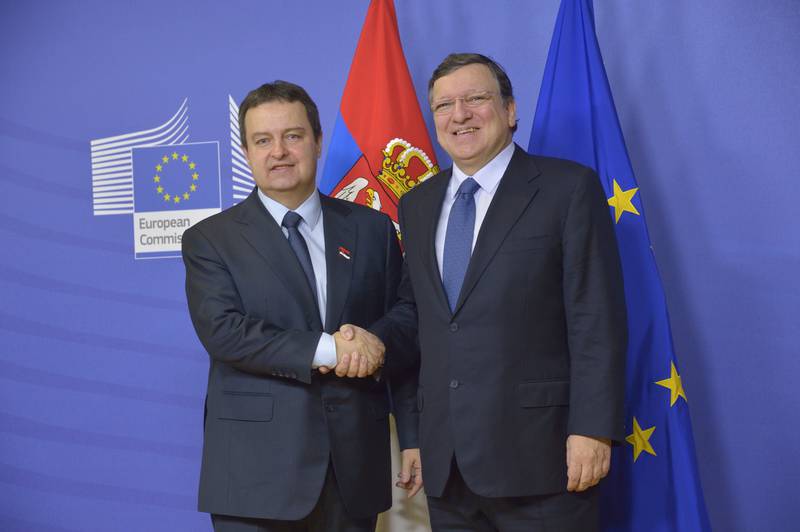 Ten years after the Thessaloníki EU commitment to the Western Balkan countries, the situation has changed a lot. Croatia already is a member of the Union, Montenegro is negotiating and Serbia is the cherry on the cake - on January 21st the accession negotiations of Belgrade with the EU have formally started. And in spite of the positive mood in Brussels that this is a historic step forward to the stabilisation of the Balkans, that Serbia is an integration champion and that it has scored the biggest progress so far, the feeling that this will be one of the most difficult accession processes prevails, because this will be the most relentless and demanding process. As EU Enlargement Commission Stefan Fule noted after the brief first association council in Brussels, during the negotiations with Serbia the EU will apply all the lessons learnt from previous enlargements. And those are:
Ten years after the Thessaloníki EU commitment to the Western Balkan countries, the situation has changed a lot. Croatia already is a member of the Union, Montenegro is negotiating and Serbia is the cherry on the cake - on January 21st the accession negotiations of Belgrade with the EU have formally started. And in spite of the positive mood in Brussels that this is a historic step forward to the stabilisation of the Balkans, that Serbia is an integration champion and that it has scored the biggest progress so far, the feeling that this will be one of the most difficult accession processes prevails, because this will be the most relentless and demanding process. As EU Enlargement Commission Stefan Fule noted after the brief first association council in Brussels, during the negotiations with Serbia the EU will apply all the lessons learnt from previous enlargements. And those are:
- we should not turn our backs on the past;
- good neighbourly relations require persistence, dialogue and compromises;
- the treatment of minorities, different people and ordinary citizens is a proof of a complete adoption of the European values;
- the economy is free when equal rules apply to everyone.
Reconciliation with the past is the best foundation for a better future
One of the most painful lessons in the Balkans is the approach toward history. And that still is the countries' from the region weakest spot. Many European and national politicians used the formal start of the accession negotiations with Serbia to recall that 2014 is the year of the 100th anniversary of World War I, the beginning of which was marked in the Balkans, in Sarajevo. A century which has left deep scars throughout the Balkans, some of which are still painful and bleeding here and there. A century during which Europe was not an innocent observer, as many Polish MEPs noted. The EU did not pass the test. We bear responsibility for what is happening in the Western Balkans today, said Krysztof Lisek (EPP, Poland) on January 15th during the debate on Serbia's progress report in the plenary of the European Parliament in Strasbourg.
The Croatian MEP Davor Ivo Stier, also from the EPP, recalled that this year marks the 21st anniversary of Slobodan Milosevic's sad speech, which "marks the beginning of the tragedy in the recent past in the region". Serbia has changed, he added, but it should scrutinise its past, assess the Milosevic period, allow access to the archives of the former Yugoslav secret services and pursue crimes. In the same spirit spoke all Croatian members of the European Parliament, as Ruža Tomasic from the ECR group went as far as to say that Serbia has not changed at all. She directly asked Commissioner Fule if he would demand Serbia to reconcile with the past. "Will you do that?", she asked. Andrej Plenkovic 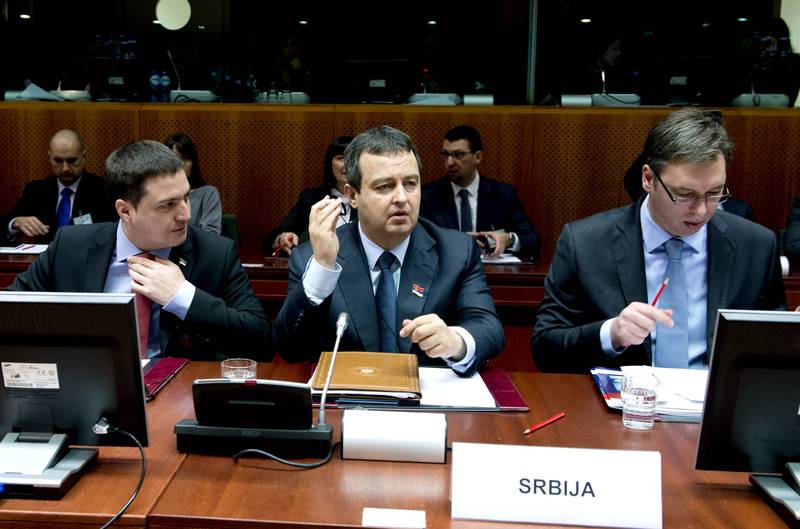 (EPP), pointed out, too, that Serbia has to tackle the problems from the past, take a political responsibility and come to terms with its neighbours.
(EPP), pointed out, too, that Serbia has to tackle the problems from the past, take a political responsibility and come to terms with its neighbours.
Responding, Commissioner Fule said he would do his best in the remaining time until the end of his term (this autumn). But according to him, the new approach negotiations to begin from chapters 23 and 24 ("Judiciary and fundamental rights", "Justice, freedom and security") will create a well-functioning democracy, conditions the civil society to flourish and a strong environment for the fundamental rights and freedoms. "These are the conditions for countries to come to terms with their past", he added. The EU Commissioner underlined that the main focus this year will be on the preparation for the opening of precisely these two chapters. Serb media and the political elite pressured the negotiations to begin as fast as possible and from the lighter chapters. In an interview with the Serb national TV RTS, Ivica Dacic even said he had no idea which chapters would be opened first, pointing out that he expected at least two to be opened during the Greek presidency.
Another expectation in Belgrade is one of the first chapters to be Chapter 25 "Other issues". According to informal information, this is the chapter that will monitor progress in the dialogue between Belgrade and Pristina. Serbia is aware that chapters 23, 24 and 35 will be the first opened chapters and will be closed last. Kosovo, for that matter, is also a very big chapter from the past Serbia has to reconcile with. Some haste could be felt, though, in Ivica Dacic's words, on the issue of the political dialogue with Pristina. On RTS he admitted he hoped some of the still unresolved bilateral issues to be resolved by the end of the term of EU's foreign policy high representative Baroness Ashton because, in Mr Dacic's words, no one knows who will succeed her on the post. One of those unresolved issues is the establishment of an association of the Serb municipalities in Northern Kosovo.
At this stage, it is still early to forecast how exactly will the issue of the past be treated in chapters 23 and 24, but Serbia's Yugoslav past is a source of many still unresolved problems. For instance, one of the tests for the Serb readiness to embrace the European system of values will be the successful resolution of the murder of Slavko Curuvija, a journalist, in April 1999. An interesting detail is that there was movement on this case for the first time last week when, during a broadly promoted in media police operation, two people were arrested for the killing of the journalist, believed to be very closely linked to Slobodan Milosevic's wife Mira Markovic. The secret services of former Yugoslavia are responsible for the murder and the arrested are former members of the services.
In the European Parliament's draft report on Serbia, there is a text proposed by Bulgarian MEP Andrey Kovatchev and colleagues of his, calling on Serbia to eliminate the role of the former communist secret services. Something that Bulgaria, for instance, failed to do and the country is currently going toward a complete failure, as euinside recently wrote. And as Dacic himself said that January 21st was the most significant historic event for Serbia since World War II, Belgrade will have to dig really deep into its history to find a durable solution. It is a good idea Chapter 35 to monitor the dialogue between Belgrade and Pristina, but it would be equally good if the role of the communist services were highlighted in a separate chapter or, at least, received a reciprocal attention in other chapters.
The reforms of the judiciary is at the core of transformation
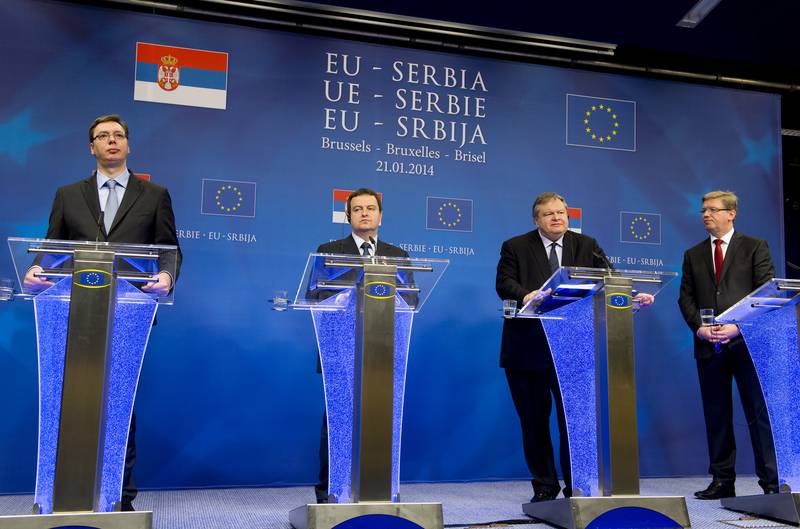 The biggest test, however, will be the reform of the judiciary and especially the fight against corruption and organised crime. For the purpose, rapporteur Jelko Kacin (ALDE, Slovenia), called on the Serbian political elite to build a strong consensus on the strategic issues and to turn for help to the civil society. According to Marije Cornelissen (Greens, The Netherlands), in Serbia there are too many people with remarkably great power, who profit from the status quo and resist reforms. She hoped the Serb government will face their resistance and will overcome it. Tanja Fajon, a Slovene MEP from the group of Socialists and Democrats, also called on Serbia to guarantee media freedom, counteract corruption and organised crime. She pointed out that membership were much more important than populism.
The biggest test, however, will be the reform of the judiciary and especially the fight against corruption and organised crime. For the purpose, rapporteur Jelko Kacin (ALDE, Slovenia), called on the Serbian political elite to build a strong consensus on the strategic issues and to turn for help to the civil society. According to Marije Cornelissen (Greens, The Netherlands), in Serbia there are too many people with remarkably great power, who profit from the status quo and resist reforms. She hoped the Serb government will face their resistance and will overcome it. Tanja Fajon, a Slovene MEP from the group of Socialists and Democrats, also called on Serbia to guarantee media freedom, counteract corruption and organised crime. She pointed out that membership were much more important than populism.
Romanian MEP Scaba Sogor (EPP) appealed, though, against forgetting what happened with Bulgaria and Romania. The price paid for their accession completely unprepared is very high. Today, many experts claim that if the two countries had resolved their problems during the negotiations, they would not have been again on the table, the MEP added. And that is an important remark, even more coming from a MEP from Romania. The experience with Bulgaria and Romania shows that the established post-membership mechanism does not work. This is recognised already by the European Commission itself. Recently in an online dialogue with bloggers, myself among them, Vice President Viviane Reding admitted that after accession it is very difficult to demand reforms. This applies equally, as a matter of fact, not only to Bulgaria and Romania, but also to countries that need economic reforms, like France, for instance.
PM Ivica Dacic assured that it was never easy for Serbia and it is not afraid of challenges. He was convinced that his country will succeed. His first deputy Alexander Vucic, believed to be the most powerful man in the country, asked, for his part, whether the EU would be ready to accept Serbia in 2020 because the country will complete the negotiations in 2018. And mentioning Alexander Vucic, a serious attention deserves the question by Dutch MEP Bastiaan Belder, who is from Nigel Farage's group of Europe of Freedom and Democracy (EFD). He asked the EU commissioner whether he considered Vucic a threat to democracy because of the concentration of power in only one person. The MEP recalled Vucic's role in the Milosevic's regime and called against compromises for the sake of Kosovo.
The question is crucial and does not affect Serbia only. The concentration of power is a temptation in the countries that have failed to build solid state institutions. This is precisely what Croatia's first Deputy Prime Minister and Foreign Affairs Minister Vesna Pusic focused upon in Brussels. To her, this is the most important process. In Serbia, there is an intensive talk about forthcoming early elections and according to media speculations they are prepared precisely with the aim Alexander Vucic to replace Ivica Dacic. The expectations of elections are so high that the RTS reporter asked Mr Dacic on Monday evening whether he would return from Brussels directly to the prime minister's office or his election headquarters. Quite telling about Vucic's role in Serbia is also the fact that he was by Dacic's side all the time in Brussels and also took part in the news conference.
It's the economy, stupid!
May be, one of the most raised issues during the debate on Serbia in the Europarliament last Wednesday, was about economy. This completely reflects the realisation that the restructuring of the economies in the former totalitarian states is a huge challenge, especially against the backdrop of the crisis all over Europe. In the 2014 enlargement strategy, the European Commission has decided to apply a light version of the European Semester to demand economic reform that go much beyond the broad economic criteria from Copenhagen. The economic situation of the countries in the Western 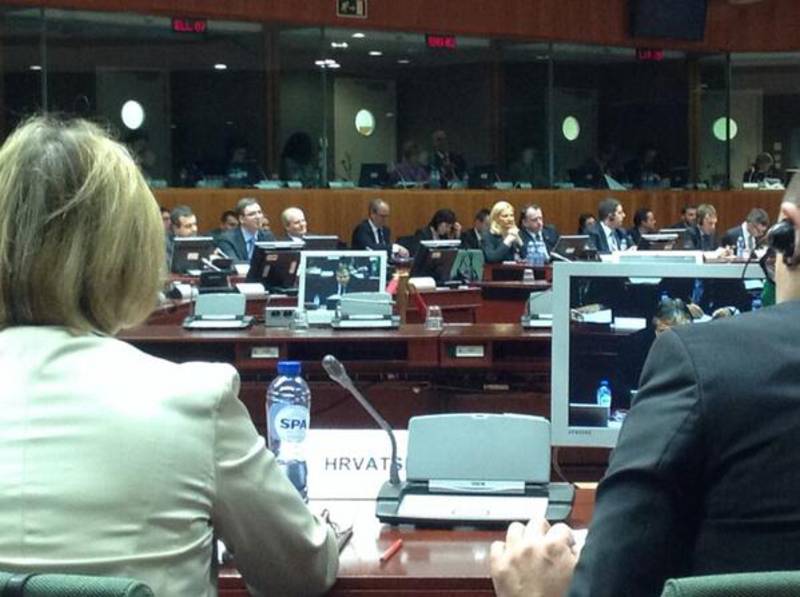 Balkans shows that this is very important and timely decision. And the questions raised by the MEPs drew an even dimmer picture.
Balkans shows that this is very important and timely decision. And the questions raised by the MEPs drew an even dimmer picture.
Hungarian MEP György Schöpflin (EPP) said that corruption flourished where the state meets the private sector when there is no strong administration. So far the proposed measures are only more centralisation and political actions. The economic situation is one of the most serious issues and urgent actions need to be undertaken, he added. Bastiaan Belder from EFD also pointed out in his statement that special attention needed to be paid on Serbia's growing impoverishment. One of the biggest risks at the moment is of huge social unrest in Serbia and the entire region, he said. His fellow group colleague Lorenzo Fontana (Italy) represented entirely the spirit of the group by outlining the risks of migrant flows, especially toward Italy, by seeking better life Serbs and especially Kosovars.
Serbia is the key to the peaceful future of the Balkans
Everyone in Brussels were unanimous that the formal start of negotiations opens a new chapter in the history of the Balkans and of Europe. That is why it was very telling which countries had sent high level officials to attend the ceremony in Brussels. Croatia, Romania and Austria sent the highest officials. Zagreb sent its first deputy prime minster who is also a minister of foreign and European affairs, for whom the relations with neighbours are of particular importance. Vesna Pusic said there were many issues Croatia and Serbia had to resolve from their past, but the fact that Serbia chose the European system of values and started negotiations means that both countries have common issues about their future as well. Austria, too, sent a foreign minster - Sebastian Kurz.
Romania's top diplomat Titus Corlăţean also attended the first conference. Romania is one of the five EU member states that have not yet recognised Kosovo's independence and has remarks against Serbia's treatment of the rights of minorities. This is precisely the reason why Hungary sent its secretary for the European affairs Eniko Gyori. The motor of the EU - Germany and France - sent their state ministers - Germany's Michael Roth and France's Thierry Repentin. Bulgaria, in spite of regularly criticising the treatment of the Bulgarian minority in Serbia by the authorities, was represented only by its permanent representative Dimitar Tsanchev. According to a highly placed diplomat, who asked not to be 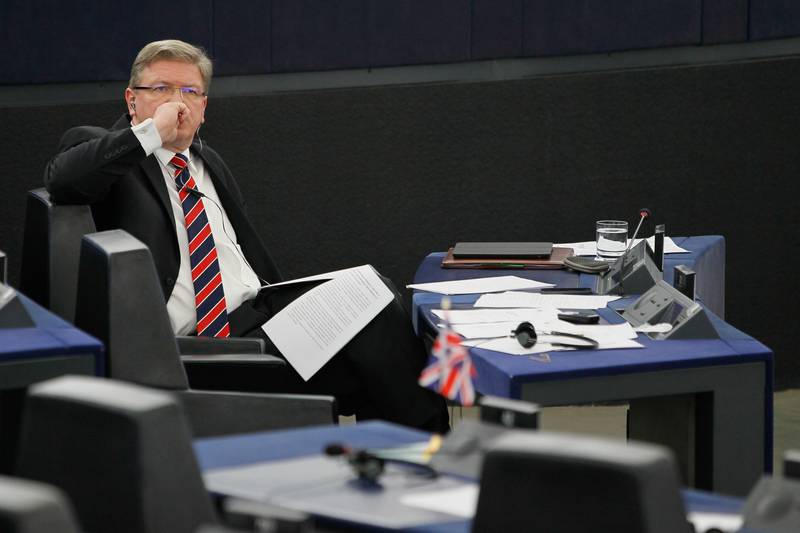 named, the Foreign Minister Kristian Vigenin's absence in Brussels was a surprise. "He should have been here", the diplomat told this website.
named, the Foreign Minister Kristian Vigenin's absence in Brussels was a surprise. "He should have been here", the diplomat told this website.
Serbia expects to start the negotiations in essence in the summer at the earliest. The second intergovernmental conference will take place on July 25th. But everything depends on the tempo of the screening process of the Serb legislation. Serbia claims it is ready. Let us hope that the EU is ready, too, to meet all the challenges. It is important not to miss this historic chance Serbia to become the first Balkan nation to be excellently prepared for EU membership. Slovenia and Croatia in many respects were well prepared, but the economy proved a problem. Serbia has a chance to be the Balkan redemption of Europe. That is why, let's wish it all the best!
 Bakir Izetbegovic, Andrej Plenkovic | © Council of the EU
Bakir Izetbegovic, Andrej Plenkovic | © Council of the EU Aleksandar Vucic, Recep Tayyip Erdogan | © Serbian Presidency
Aleksandar Vucic, Recep Tayyip Erdogan | © Serbian Presidency Jean-Claude Juncker, Zoran Zaev | © European Commission
Jean-Claude Juncker, Zoran Zaev | © European Commission